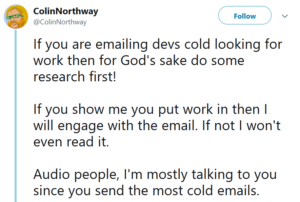It regularly blows my mind that many audio professionals actually don’t know what their job is.
Most of what I hear said today is audio is supposed to “serve the project.”
I don’t even know what that means.
(Don’t email me and explain to me what it means to you – I don’t care. I might end up putting more clear words in your mouth by the end of this anyway)
When I hear that, I envision a group of people sitting in a room pow-wow’ing over what a project is supposed to be, the meaning behind it, the goals, the grand vision.
Meanwhile, I’ve never worked on a project where the vision at the beginning (or middle) was so static that it never changed until the end. That has literally never happened to me – at least on something creative and long-term.
Those of you who have these perfect projects, kudos to you. I think that you’re super lucky, and I’m a tad envious.
But because I’ve never had anything like that – I came up with my own definition. It’s always served me well, and it’s never failed to hold true.
My job, as an audio professional, is effective communication.
I don’t just mean words, spoken or written. I mean communication with noises and sounds.
When I worked doing on-set film production, the dialogue I was recording better be clear as the ocean in Hawaii. Why? Because it was the most important thing communicating to the audience for 90% of the movie.
When I worked doing live events, every music transition I made had to be precise; every speaker mic had to work and be audible. There was never a “hoping” or “betting” it worked – no options. Why? Again, because these things informed my audience.
Games? Same thing.
(This is where you’re about to nod your head that I’m clarifying “serving the project”)
Footsteps? You’re walking on something, and what you’re walking on is important. Damage feedback? You’re getting hit and move or die.
So, you can see there’s two steps to the process.
- Is it “quality” audio – meaning properly created in a technically sound way.
- Does the quality audio “fit – meaning does it communicate the intended message properly.
#2 is more important than #1, every time. You can take poorly recorded sounds (sometimes even intentionally) and they can fit and communicate effectively.
Where You’re Ineffective
Here’s the part that gets me the most.
Audio professionals spend so much time debating the merits of audio quality and purpose of communication, you think that we would all be masters at communicating with other humans.
But… it seems as if we’re not. Or, at least most of us aren’t. That kills me, it really does.
Check this out:

Colin is an independent game developer. He’s friends and has worked with people that I’m friends with. I have tremendous respect for Colin by proxy, and because the man is clearly successfully doing what he wants.
Friends – who does he call out here?
Yeah.
I don’t disagree with him at all. While the majority of you who email me are super nice sweethearts – I’m also not someone who is immediately going to hire you or hook you up with a brilliant gig. I have some books and some software – go me.
My friends on the other hand (and others, as evidenced by that tweet) complain loudly to me at how most of you flat out suck when it comes to opening your mouths or writing to another human.
In Quit Aspiring I dealt with the “how to get into another room and not come off like an orc, scared cat, or someone creepily obsessed with their phone while everyone else is talking.” If that last part sounds like you – go buy it.
Today I have another deal for you though, not just the book. This one is free.
I know a significant number of you have people that you look up to, or want to work with. Perhaps your network is small too. Plenty of people give the advice of “get out and meet people” or “take significant people out to coffee.”
I’ll even tell you to setup a Skype meeting with someone out of state by searching out their local Starbucks, getting their drink order, and making the mobile order for them. (Wild, I know, but they’ll never forget you)
But how the hell are you supposed to do that when you write emails that get ignored or trashed?
So many of you panic, freeze up, don’t know what to write, and just babble endlessly for pages while trying to figure out what you’re trying to say.
Then you beat yourself up for it.
But you never actually fix the problem.
Well… I wrote a thing for you, problem solved.
I’m calling it The 5 Big Mistakes: Simple, Powerful Rules to Get People Replying to your Emails.
You may have seen it on the new home page, or with the new signup form above.
That’s the only way to get it, friends. It’s free to everyone on my email list (if you’re already on the list, you’ll get it automatically).
When you get it in your hands and read through it (it’s 10 pages), you not only won’t suck as much at email immediately after, you’ll get an added benefit.
People will start replying back enthusiastically.
Oh, and if you don’t write crappy emails but get a bunch?
Pass it on to people you get crappy emails from.
So scroll back up, enter in your information, and grab yourself a free copy of it. (You’ll also get Made from Scratch, which is 12 pages of resources to help you learn Audio Programming)
I hope it serves you well, and you start communicating tremendously better with your fellow humans starting today.
Copyright 2016-2021, NIR LLC, all rights reserved.
